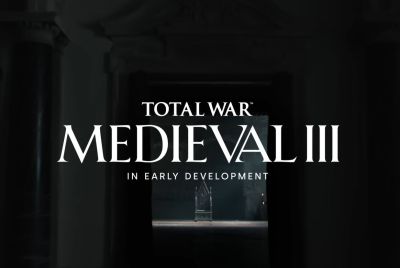Call Of Duty Advanced Warfare Review: Even Kevin Spacey Cannot Save This Off-Target Shooter
Call Of Duty Advanced Warfare
- Developer – Sledgehammer Games
- Publisher – Activision
- Platforms – PS4 (tested), PS3, Xbox One, 360, Microsoft Windows
- Release date – Out now
- Price – £45.99
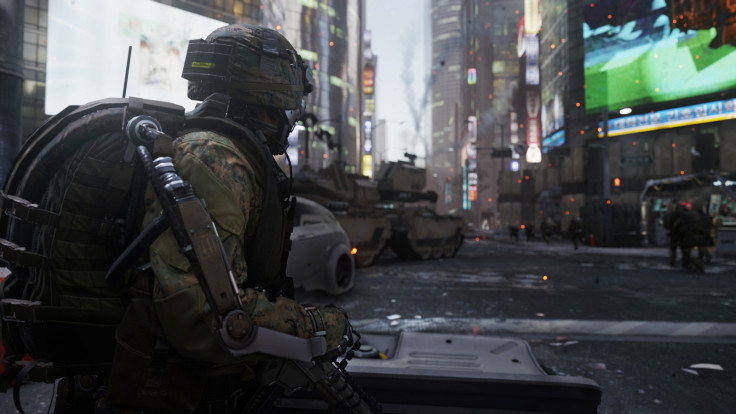
In the seven hours it took me to complete Advanced Warfare, I killed exactly 1,289 people. I know that because the game counted them for me and occasionally gave me awards when I crossed milestones like 100, 500 and 1,000.
My final bodycount wasn't unprecedented for a videogame but I find it hard to take seriously the story of Advanced Warfare - or, for that matter, the story of any game where killing is this banal.
When people die, en masse and without consequence, any melodrama is undercut. Advanced Warfare's narrative endgame, wherein the villain is planning to launch rockets that will kill thousands of people, doesn't sell, because thousands of people have already been killed, in front of you - by you - and the world has remained unaffected.
It's perhaps unfair to lay this at the door of Call of Duty because almost every game has the same problem. But when you have access to millions of dollars, and an Oscar-winner, Kevin Spacey, leading your cast, you have an increased responsibility to find good writers.
I never expected Advanced Warfare to be high art, but plenty of games of the past decade, including Wolfenstein, Far Cry 2 and even the original Modern Warfare, have shown war-shooters can have something to say, or at least be consistent.
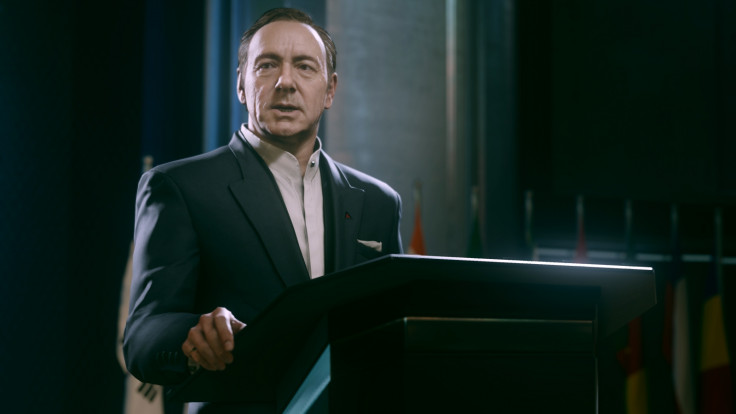
In my time as a reviewer for IBT, I've always tried to find the best in AAA titles. Even the most corporate, hedonistic, carefree games contain, I like to believe, some small signs of progress, a mechanic or line of dialogue which intonate that at least a developer is trying.
But Advanced Warfare is completely backward. It's emblematic of what videogames were ten, maybe 15 years ago, back when story and action existed in vacuums and all that mattered was spectacle. It's easy to get despondent, but mainstream games are gradually moving forward. The pace of change might be glacial, but still, Call of Duty will soon be left behind.
Even ignoring that ideal, that games should become successively more sophisticated, that they should learn from and be beholden to the standards set by their contemporaries, Advanced Warfare is bad. Its proponents will always fall back to the same philosophical Alamo: it's just meant to be dumb fun. But this time around, Call of Duty is not even that.
"Dumb fun" is not a capricious term, which discharges developers of any and all responsibility. If a game has poor writing and ill-thought out mechanics, you can't defend it indefinitely under the simple rubric that it's not supposed to be intelligently criticised.
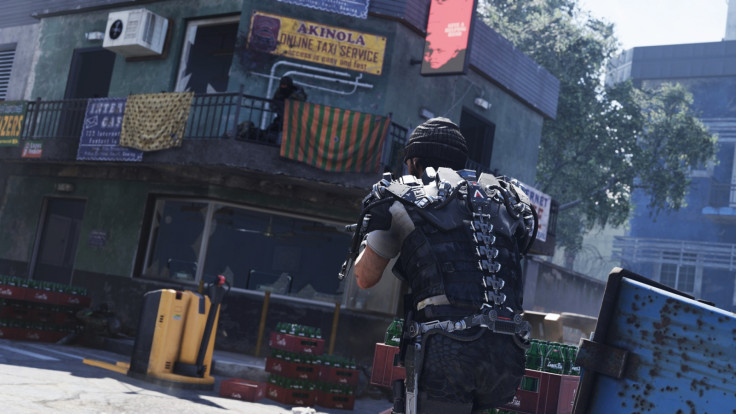
At some point in Advanced Warfare, I decided to stop caring about the script, the politics, and to try to meet the game on its own terms – to imbibe it as something meant simply for enjoyment. But it throws so many new ideas and mechanics at you, so many gadgets and additions, that it becomes difficult to indulge in the core experience of shooting.
Ostensibly unable to cope with the pressure of delivering the eighth console Call Of Duty game in seven years, Sledgehammer has inserted idea after idea after idea into Advanced Warfare, filling it to the brim with single-use mechanics and inexplicable set-pieces.
One level, you're using a jetpack to safely descend from a building. The next, you're climbing a wall using some magnetic gloves. Then you're piloting a drone. Then you've got an invisibility suit. Then you're flying a plane, driving a boat, using a mech suit.
The best game designers imagine one, maybe two simple mechanics then give players new environments and situations to use them in. If you think of Portal, the player's physical input never changes: she uses the same portal gun, with the same properties, throughout the game, the challenge being that she has to adapt those unchanging mechanics to increasingly detailed puzzles. It's sparing and exact, an intelligent way to design a game.
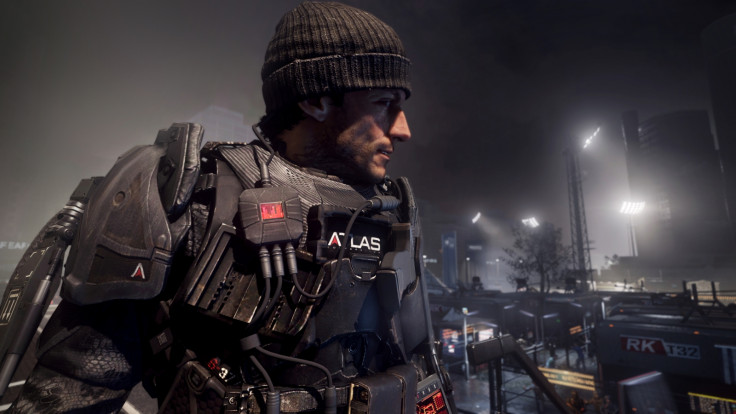
But the makers of Advanced Warfare, seemingly concerned by the words of reviewers, who for the past four years have accused Call Of Duty of unoriginality, have packed their game with raw, disposable mechanics. Aside from shooting, it's never a case of learning something and then applying it to a new situation.
Players are merely told how to do something – how to operate one of the game's many pieces of fictional technology – then are given some empty spectacle related to it. A few mechanics reappear, but not in any sustained or meaningful way. They're all used only at sporadic, specific points – you're able to use these things, but not play with them. I don't think that's conducive to a game of dumb fun.
As usual, the politics of Call Of Duty have to come into question. Advanced Warfare is set in 2060, in a world only vaguely comparable to our own. That seems like an effort to separate the game from any meaningful political discussion, a way of excusing Call Of Duty from debates around contemporary issues.
It's like we're going back to the early 1990s, when games were predominantly set in fantasy or sci-fi worlds. I've said it already but Advanced Warfare, despite its futuristic aesthetic, is entirely retrograde. It's a cultural paradox, fashioned from the most sophisticated and impressive game-making technology but emblazoning of attitudes from around 20 years ago.
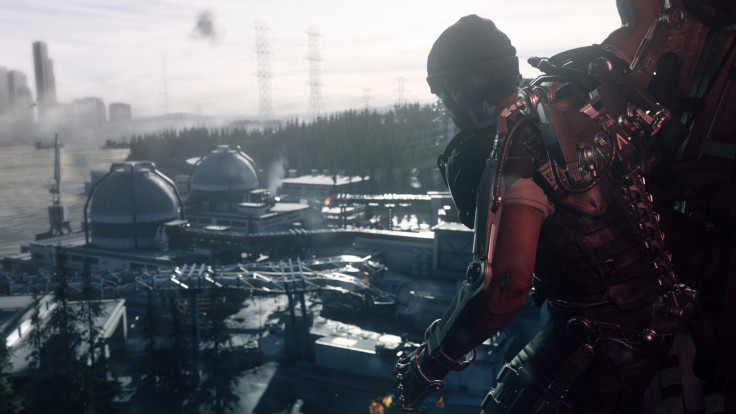
There's one aspect of its narrative however which might constitute an analogy. The two warring factions are the US army and Atlas, a private military company, overseen by Spacey's villain. It's no surprise the army wins, since it's the side the player is on, but I feel that's an unusually left-leaning ending for Call Of Duty.
Atlas, surely, represents individualism, elitism and unbridled capitalism, and it's defeated by Big Government – by a force governed not be a wealthy, self-made individual but a representative elected by the body politic.
The conclusion to Advanced Warfare is still incredibly patriotic, but it celebrates, in its own way, the Western values that are actually worthwhile. It does not end with the death of a mass-murdering, arch person of colour. Instead, he's a white American, rooted firmly in the systems of big business, profiteering and waging war in the name of self-interest.
Maybe that is the one thing in Advanced Warfare that I can hang on to, that one sign that Call Of Duty – the biggest game of all – is perhaps moving forward along with the rest. Since this is my last review for IBTimes UK, I'd like to go out on that small note of hope.
Call Of Duty Advanced Warfare Scores:
- Gameplay: 4/10 – Confused, overloaded with new and one-use mechanics.
- Graphics: 8/10 – It's a good-looking game, no doubt. Kevin Spacey's avatar is a bit dead behind the eyes.
- Writing: 3/10 – The ending is a change of tact but the rest is no good at all.
- Sound: 5/10 – Confident voice-acting but bland music and often puny sounding weapons.
- Replay value: 7/10 – Multiplayer, challenge modes, the works – if you get into this, you'll be with it a while.
- Overall: 4/10 – Games are better than this now. Call of Duty is becoming a relic.
© Copyright IBTimes 2025. All rights reserved.



